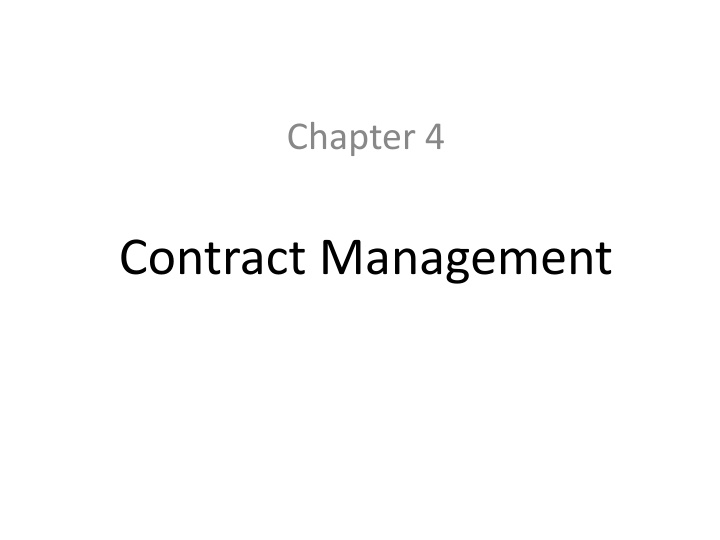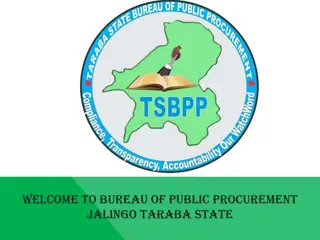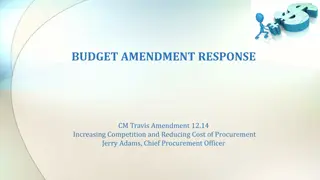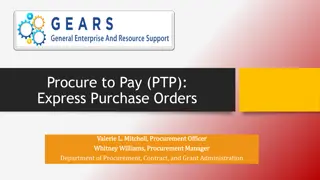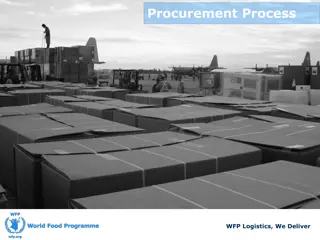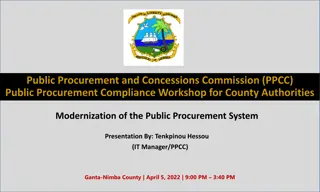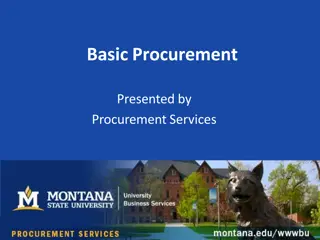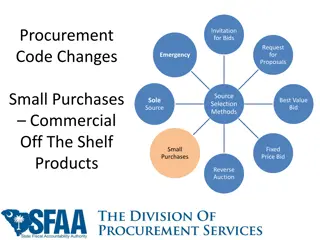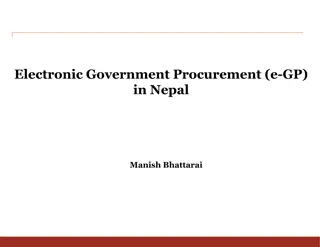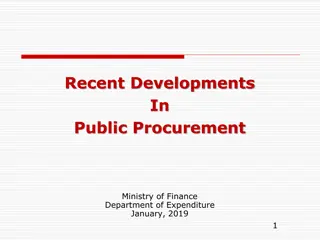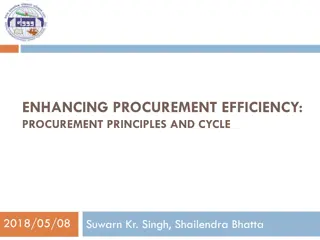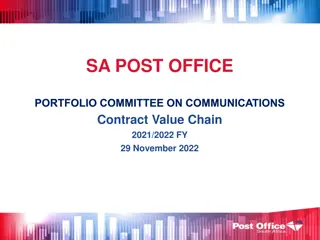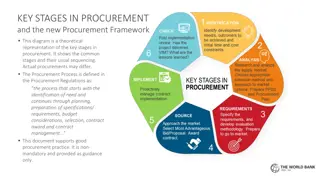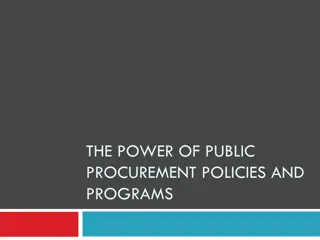Effective Contract Management and Procurement Practices
The Public Procurement Act of 2063 lays down guidelines for procurement by public entities, emphasizing preparation of specifications, cost estimates, and selection methods. Entities must follow prescribed methods for goods, services, and consultancy, ensuring fair competition and transparency in the procurement process.
Download Presentation

Please find below an Image/Link to download the presentation.
The content on the website is provided AS IS for your information and personal use only. It may not be sold, licensed, or shared on other websites without obtaining consent from the author.If you encounter any issues during the download, it is possible that the publisher has removed the file from their server.
You are allowed to download the files provided on this website for personal or commercial use, subject to the condition that they are used lawfully. All files are the property of their respective owners.
The content on the website is provided AS IS for your information and personal use only. It may not be sold, licensed, or shared on other websites without obtaining consent from the author.
E N D
Presentation Transcript
Chapter 4 Contract Management
The Public Procurement Act, 2063 The Public Procurement Regulation, 2064 Date of certification and publication 30th Poush 2063 (14 January 2007)
Procurement means acquisition of any goods, consultancy services or other services or carrying out or causing to be carried out any construction works, by a public entity pursuant to this Act;
Description of Goods, Construction Works and Services to be Prepared : Prior to procuring goods, construction works or services, a Public Entity shall have to prepare specifications, plan, drawing, design, special requirement or other descriptions pertaining thereto.
Cost Estimate to be Prepared: A Public Entity shall have to prepare a cost estimate as prescribed for any procurement whatsoever.
Procurement Method to be selected: A Public Entity while procuring shall have to procure by applying any of the following methods based on such conditions and purchase price as prescribed:-
Procurement Method to be selected: (a) For procurement of goods, construction works or other services: (1) By inviting open bids at international level, (2) By inviting open bids at national le vel, (3) By inviting sealed quotations, (4) By procuring directly, (5) Through participation of users' committee or beneficiary group, (6) Through force account.
Procurement Method to be selected: (b) Procurement of consultancy service: (1) By requesting competitive proposals, (2) Through direct negotiations. (2) In making procurement pursuant to this Act and the rules framed under this Act, procurement shall not be so made in piece- meal as to limit competition.
Process in Procurement A Public Entity shall establish a procurement unit or assign the responsibilities thereof in order to carry out the following acts: (a) Preparing a procurement plan, (b) Preparing prequalification documents, bidding documents and procurement contract related documents by making necessary amendments in the standard bidding documents, standard prequalification documents and standard procurement contract documents prepared by the Public Procurement Monitoring Office,
(c) Preparing documents relating to proposals for consultancy services by making necessary modification in the standard request for proposal prepared by the Public Procurement Monitoring Office, (d) Publicly publishing the procurement notice, (e) Issuing pre-qualification documents, bidding documents or forwarding documents relating to proposals for consultancy service,
(f) Receiving and safely keeping pre-qualification proposals, bids or consultancy service proposals, (g) Submitting the pre-qualification proposals, bids or consultancy service proposals to the evaluation committee for evaluation and submit the evaluated bids for acceptance, (h) Notifying the acceptance of the pre-qualification proposals, bids or consultancy service proposals,
(i) Obtaining, examining and safely keeping the performance guarantee, (j) Examining, or causing to be examined, the quality standards of the goods, construction works or services that have been procured, (k) Making available the information and documents asked for by the Public Procurement Monitoring Office, and (l) Performing other functions as may be prescribed.
Functions, Duties and Powers of Public Procurement Monitoring Office: (a) To make recommendation to the GoN for reform in the procurement policy or laws in force, (b) To issue technical guidelines and manuals required for implementing this Act, (c) To prepare standard model of the standard bidding documents, prequalification documents, procurement contract document and documents relating to proposal to be used by a Public Entity to conduct procurement proceedings, (d) To collect statistics of procurement proceedings and to monitor or to make technical auditing of whether or not such proceedings are conducted in compliance with this Act or Regulations or manual, made there-under
Functions, Duties and Powers of PPMO (e) If the Public Entity seeks opinion, advice about a matter as referred to in this Act or Regulations, Manuals made there- under, to provide opinion, advice, (f) To establish and operate procurement website, (g) To publish a bulletin (h) To prepare procedures required for coordination in the procurement proceedings and submit to the Government of Nepal for approval, (i) To make arrangements for regular training program for the bidder or the employee involved or to be involved in procurement proceedings,
Functions, Duties and Powers of PPMO (j) To make necessary criteria of exclusion from the blacklist under Section 63 and exclude from such blacklist as per such criteria, (k) To review, appraise construction works, supply, consultancy service, and other services system in order to make the procurement system effective, (l) To prepare plan of domestic or foreign assistance required to systematize and reform procurement system and to act as the central body for coordinating such assistance, (m) To submit the annual report of the procurement proceedings (n) To do other prescribed functions.
Procurement Transaction Through Electronic Communications Means Government of Nepal may, by publication of a notice in the Nepal Gazette, provide a mechanism that the Public Entity may arrange, through the means of electronic communications, invite a pre-qualification proposal, issue notice of bid invitation, prepare a short list by inviting expression of interest, invite a proposal of consultancy service, transmit bidding or pre- qualifying documents, receive bids, proposals for pre- qualification or consultancy services, conclude the procurement contract, make payment and give and receive other notices.
Methods of execution references for - Works/Goods 1) Direct purchase o Minimum three quotation from standing list is required if purchase is above 25000 o Estimate up to 5,00,000 for construction work (revised) o Estimate up to 3,00,000 for goods o Estimate up to 15,00,000 for domestic products for one time in FY 2) Sealed Quotations o Estimate up to 2 million for construction work (revised) o Estimate up to 1 million goods o 15 days notice in national or local newspaper o 3 minimum quotations are required . o 45 days bid validity and 75 days bid security validity o 7 days notice for agreement o No withdraw and no modifications o Contract only within or below the estimate amount
3) National Contract Bidding (Bid/Tender) o 30 days notice in national newspaper/website o minimum one responsive bid o 9O (up to to 10 crore / 120(10 crore above) days bid validity and 120/150 days bid security validity o 15 days notice for agreement o One time withdraw or modifications o Single or joint venture (maximum 3 and not less than 25% share) o Selection notice for 7 days o Contract can award if bid amount is not substantially higher than the approved estimate
4) International Contract Bidding (Bid/Tender) o 45 days notice in national English newspaper or international journal/website o minimum one responsive bid o Single or joint ventures 5) Users committee / beneficiary committee o Including all cost o Up to 6 million o Up to one third of estimate mobilization
Methods of execution references for- Goods 6) Direct purchase o Minimum three quotation/proposal from standing list is required if purchase is above 25000 o Estimate up to 3,00,000 for" purchasing goods 7) Sealed Quotations o Estimate up to 1 million o 15 days notice in national or local newspaper o 3 minimum quotations are required o 45 days bid validity and 75 days bid security validity o 7 days notice for agreement o No withdraw and no modifications o Contract only within or below the estimate amount
8) NCB (Bid/Tender) o 30 days notice in national newspaper o minimum one responsive bid o 9O / 120 days bid validity and 120/150 days bid security validity o 15 Days notice for agreement o Onetime withdraw or modifications o Single or join venture (maximum 3 and not less than 25% share) o Contract can award if bid amount is not substantially higher than the approved estimate 9) ICB (Bid/Tender) o 45 days notice in national English newspaper or international journal/website o Single or joint venture 10) User's committee / beneficiary committee o Including all cost
Methods of work execution Procurement of works : ICB/NCB/Sealed Quotations/Direct/Users group/Special/Non-government/Amanat Procurement of goods : ICB/NCB/Sealed Quotations/Direct/Users group/Special/Non-government/Amanat Procurement of consultancy services Competitive (15 days' notice of EOI & 30 days notice of presenting Proposals) /direct * EOI = Expression of Interest
Tendering procedures Tender:- (Definition) Offer in writing by the tenderer/owner (the person/firm who offers the tender) to execute some specified work or to supply some specified goods at certain rate/amount within stipulated time under certain conditions of agreement. It s the initial process/step in formulation of contract.
Purpose for tendering / bidding Use of fund for intended purpose (project implementation). For the observation of economic and efficient project (best value for money) . To give an equal opportunity to compete for eligible bidders . To encourage for the development of domestic contracting & manufacturing industries. For the transparency in all stage of procurement process.
Tender notice lt is the information inviting bids from competent and capable contractors firms/service providers and forms a part of contract document lt should be widely published in important newspapers or acclaimed national daily newspapers eg : Gorkhapatra / Kantipur / Nagarik etc.
Preparation before inviting Tender notice publication Project preparation Estimation of quantities Cost estimation (abstract of cost) Approval of cost estimate from concerned authorities Resource planning Tender/bid document preparation & approval Tender invitation
Information to be furnished in Tender Notice Name of authority publishing the notice First date of publication Brief description of the job Duration of the project to be completed Date time and place-where and when the bid documents is available and to be submitted Cost of tender/bid document Cost estimate (optional) Date, time and place of opening the tender/bid Earnest money(bid security) and security deposit amount(performance security) Expected date of acceptance of successful bids etc.
Earnest money (bid security): it is the amount of money deposited while bidding a tender as a guarantee of the party's willingness of carrying out the work awarded to him/them it s amount generally ranges from 1% to 3% . ln Nepal 2.5% of the bid amount is demanded as earnest money and for foreign party, the amount is considered to be 5% This money(fund) is refunded to unsuccessful bidder. lf a successful bidder fails to carry the work, this amount will be forfeited
Security Deposit (Performance Security) lt is the amount of money which is deposited by a successful bidder as a security for the satisfactory performance (quality of work) ln Nepal, security deposit is equal to 5% of the contract amount whereas 10% of the bid amount will be taken as security amount for foreigner lt includes the earnest money deposited This is refunded after the completion of defect liability period (maintenance period) This fund can be forfeited if contractor fails to perform his duty
National Competitive Biddings (NCB) Local competitive bidding All the eligible bidders are invited to participate in bidding Tender notice to be published in national daily newspaper for two consecutive days Aiso, tender shall be published in the concerned office
International Competitive Bidding (ICB): If the amount of work is huge and national/domestic contractor cannot perform the job, eligible bidders are invited from all over the world In this process tender notice is provided to diplomatic missions working in the country Information to be furnished in the bid by foreign bidder o Whether the bidder is having a local agent or not o Name and address of the agent if any . o Types of the service being provided by the agent o Currency and procedure of payment to the agent o Other agreement with the agent if any
Qualification Procedure for tendering Two forms of qualification : A. prequalification and B. post-qualification - are used to ensure that bidders have adequate capability and resources to perform the particular contract satisfactorily, taking into account their 1. Experience record on works of a similar nature and complexity, 2. Financial capability, 3. Personnel capability, 4. Equipment capability and 5. Litigation(Legal Actions) history. 6. Other relevant information of certification (lSO certificate), particular job experience, methodology etc
Pre Qualification is carried out in advance of bidding to establish a list of capable firms to be invited to tender while ensuring that a proper level of competition is safeguarded. Post Qualification is used where no prequalification has been carried and bids are invited at large from one or more classes of contractor, and is carried out after bids are received as part of the bid evaluation process. Post Qualification has the advantage of reducing the total procurement time by cutting out the prequalification steps.
Pre-Qualification (PQ) It is a process of short listing of eligible bidder and to avoid crowd of bidder. Also, it ensures that the invitation to the-bid is extended only to those perspective bidders who have adequate capability and resources to perform the work/contract satisfactorily taking into accounts their: Experience & past performance on similar work/contract Capabilities with respect to personnel , equipment and construction & manufacturing facilities Financial status Litigation history
Benefits of Prequalification Reduces the amount of work and time involved in evaluating bids from unqualified contractors Encourages local firms to form joint ventures with other local or international firms, thereby benefiting from their resources and experience Reduces significantly; if not eliminate, problems associated with low prices submitted by bidders of doubtful capability Enables contractors, who may be insufficiently qualified on their own, to avoid the expense of bidding or to form a joint venture; which may give a better chance of success The well qualified firms may also price their bids more competitively with the knowledge that they will only be competing with other qualified bidders meeting realistic minimum competence criteria The assurance that competitors which lack the necessary qualifications will be excluded from bidding thus encourages leading contractors or suppliers to bid
Post Qualification Eligible bidders can participate in the bidding. No pre-qualification process is adopted. This process may include single envelope system (financial proposal only) or double envelope system (financial as well as technical proposal). ln double envelop system successful bidders are selected by adopting one of the following three methods: 1. Short list from technical proposal and select the lowest bidder to award the contract Select the lowest bidder first and check the technical proposal. lf technical proposal is ok select the firm. If technical proposal is not satisfactory, select second lowest bidder and check the technical proposal Give weightage to both technical proposal as well as financial proposal. Then, select the bidder getting highest point. 2. 3.
Contract An agreement between two or more competent parties in which an, offer is made and accepted, and each party benefits. Agreement concluded between two or more parties for performing /not performing any work If any person or firm advances any proposal to any other person or firm and latter gives his / their consent, they shall be deemed to have a contract it is done to seek a legal action/remedies any parties breached the agreement in extensive sense, it includes every description of agreement, or obligation, whereby one party becomes bound to another to pay a sum of money or to do or to omit to do a certain act It is an act which contains a perfect obligation
Agreement It is the acceptance to the offer (proposal) with or without any conditions It does not have any legal obligations
Essential elements of Contract. 1. Offer and acceptance: In simple expressions, offer is a promise made by one party (or a person) to another party ( or a person). The party who made promise is called "offeror" and the party whom to whom a promise has been made is called "offeree . As per contract act 2056, the offer made by a person to another person with the intention of getting approval to do or not to do any business. Similarly, acceptance has been in the Act as the consent given by the offeree to the matters in the offer in the same spirit of the offeror. Competent parties: Both parties or person who make contract must be competent according to law Mutual intent to enter into contract : Both parties in a contact shall have intentions to establish a legal relationship. Therefore, agreements made without the intention s of establishing legal relationship cannot be considered as contract. A social, family and even commercial agreement that has no intention of establishing legal relationships can be taken as example. 2. 3.
4. Consideration: Consideration can be described as something of value that is exchanged by contracting parties (D.L Martson, Law for professional engineer, 1996). As per contract act 2056, consideration means the promise of doing or not doing any thing because of doing or not doing the work stated in the offer. In general, the court does not see for the adequacy of the consideration. 5. Capacity to contract: The parties need to have capacity to contract. As per contract Act 2056 except the following person, all others persons are capable to contract. a) Person below 16 years b) Person not in own control (mad senseless ) 6. Lawful purpose: Contract must have lawful purpose otherwise; law cannot enforce it. As per contract act 2055, contract becomes void if there is an illegal objective or consideration in the contract. a) Lawful consideration b) Law full object
7. Free consent: The parties in a contract should have given free consent that is without any correction, undue influence, fraud, misrepresentation etc. In such cases the party suffering damage may make the contract void. 8. Possibility of performance: Any contract should be within possibility of performance. The law does not consider legal of the contract work is not within possibility of performance. 9. Certainty: Contractual conditions must not be unclear and unlimited. Both parties under the contract must have understood the term and conditions
Elements of Contract. Two or more competent parties Offer & acceptance Intention of creating legal relation by both parties Considerations Capacity to contract/competence to contract Free consent Lawful purpose Possibility of performance Verbal or written and registration
Importance of contract 1. To make an agreement legally enforceable. 2. To record the terms of agreement. 3. To specify what the contractors / supplier/ service- provider must do & what the owner must pay. 4. To specify the quantity & quality of work to be done 5. To specify the time frame within which the Work is to be completed and payment to be made. 6. To specify the means, methods / mode, terms and time of payment
7. To identify the parties to the agreement 8. To identify the official agent or representatives of parties to the agreement and define their authority and responsibility 9. To set out in advance the courses of action that will be taken in different possible situations 10. To define words and establish common meanings 11. To define what is and what is not included in contract 12. To specify how the contract will be terminated 13. To specify the responsibilities of the parties not just to each other but to third parties such as government , community in which work is to be done, workers, sub- contractors, material suppliers, unions, etc.
Types of contract (Classification of contract) With respect to mode of creation : 1. Indirect contract: Not withstanding anything contained elsewhere in this act, a contract shall be deemed to have been concluded as follows in the following circumstances: A. In case a person who is incompetent to conclude a contract under this Act or other prevailing Nepal law, or any other person who is to be maintained by him/her is provided with any material, commodity or service which material commodity service paid from the property of such he/she needs and that is consistent with his social status, to have the cost of such person to the person so meeting his/her need.
B. In case any person, who is concerned with the payment or nonpayment of any amount to be paid by another person under the prevailing Nepal law makes such payment him/herself, to have that payment repaid to him/her from the property of the person who is actually under obligation to make the payment. In case any person gives anything to another person, or employs him/her in any work, to pay the appropriate cost or remuneration. In case any person keeps under his/her personal possession any property belonging to another person that property as a bailment property. In case any person pays amount (to any person) by mistake, to refund the same. C. D. E.
2. Contingent contracts: a) In case a contract has been concluded to performing or not to perform any work if any event happens in the future, the contract shall not create any liability until such event happens. b) In case a contract has been concluded subject to the condition that it shall be deemed to have been concluded in case person performs any specified work in the future, no liability shall be deemed to have emerged from that contract if such person does anything in such a manner as not to perform that work or acts in such a manner that the work cannot be performed.
3. In case a contract has been concluded to perform or not to perform any work if any uncertain event does not happen in the future, liability under that contract shall emerge only after the happening of that event becomes impossible. 4. In case a contract has been concluded with a provision to perform or not to perform any work if any event happens within a specified period in the future, the contract shall be deemed to have become invalid after the happening of that event becomes impossible within the specified period or after the expiring of that period. 5. In case a contract has been concluded with a provision to perform or not to perform any work if any event does not happen within a specified period in the future, liability under such contract shall emerge if that event does not happen within that period or if it becomes certain that the event will not happen within that period.
Types of contract (Classification of contract) With respect to legal relationship [Valid/Void/Voidable] 1. Valid Contracts: A contract that complies with all the essentials of a contract and is binding and enforceable on all parties.
